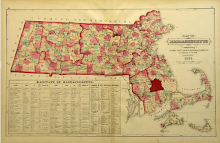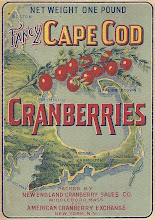 In early 1873, Middleborough caught its first glimpse of a most unusual creature - the octopus. Known at the time also as a devil fish, the octopus was only rarely seen and even more rarely captured. Although it is not known, it is likely that the octopus was shipped in late January to Professor John Whipple Potter Jenks, principal of Middleborough's Peirce Academy and a noted zoologist for examination.
In early 1873, Middleborough caught its first glimpse of a most unusual creature - the octopus. Known at the time also as a devil fish, the octopus was only rarely seen and even more rarely captured. Although it is not known, it is likely that the octopus was shipped in late January to Professor John Whipple Potter Jenks, principal of Middleborough's Peirce Academy and a noted zoologist for examination.The singular creature described by Victor Hugo in his Toilers of the Sea, has just appeared in Middleboro. Mr. C. R. Brainard, who has many rare and beautiful specimens of sea and land gathered in the South during the last season, has just received by express one of the identical creatures known as the octopod sea vampire, or devil fish. The monster grappled a diver in the waters of the coast of Georgia, and when the diver, more dead than alive, was brought to the surface, the fearful creature was captured. His open length or distance is over four feet.
Most likely local residents learning of the octopus' arrival were keen to see the "monster". Those unfamiliar with it had only to read Hugo's work for a vivid and enthralling description of the sea creature and its menacing form.
What, then, is the devil-fish? It is the sea vampire.
The swimmer who, attracted by the beauty of the spot, ventures among breakers in the open sea, where the still waters hide the splendours of the deep, or in the hollows of unfrequented rocks, in unknown caverns abounding in sea plants, testacea, and crustacean, under the deep portals of the ocean, runs the risk of meeting it. If that fate should be yours, be not curious, but fly. The intruder enters there dazzled; but quits the spot in terror.
This frightful apparition, which is always possible among the rocks in the open sea, is a grayish form which undulates in the water. It is of the thickness of a man’s arm, and in length nearly five feet. Its outline is ragged. Its form resembles an umbrella closed, and without handle. This irregular mass advances slowly towards you. Suddenly it opens, and eight radii issue abrubtly from around a face with two eyes. These radii are alive: their undulation is like lambent flames; they resemble, when opened, the spokes of a wheel, of four or five feet in diameter. A terrible expansion! It springs upon its prey.
The devil-fish harpoons its victim.
It winds around the sufferer, covering and entangling him in its long folds….
Its folds strangle, its contact paralyses.
Having read this passage, breathless Middleborough residents were no doubt grateful not to have encountered the octopus in its natural habitat.
Illustration:
"Octopus" by Victor Hugo, 1866, watercolor
Sources:
Hugo, Victor. Travailleurs de la mer [Toilers of the Sea]. Volume III. London: Sampson, Low, Son, & Marston, 1866., pp. 86-88
Old Colony Memorial, "County and Elsewhere", February 6, 1873, p. 5.






















+of+Smoky+Mountains+018.jpg)
0 comments:
Post a Comment